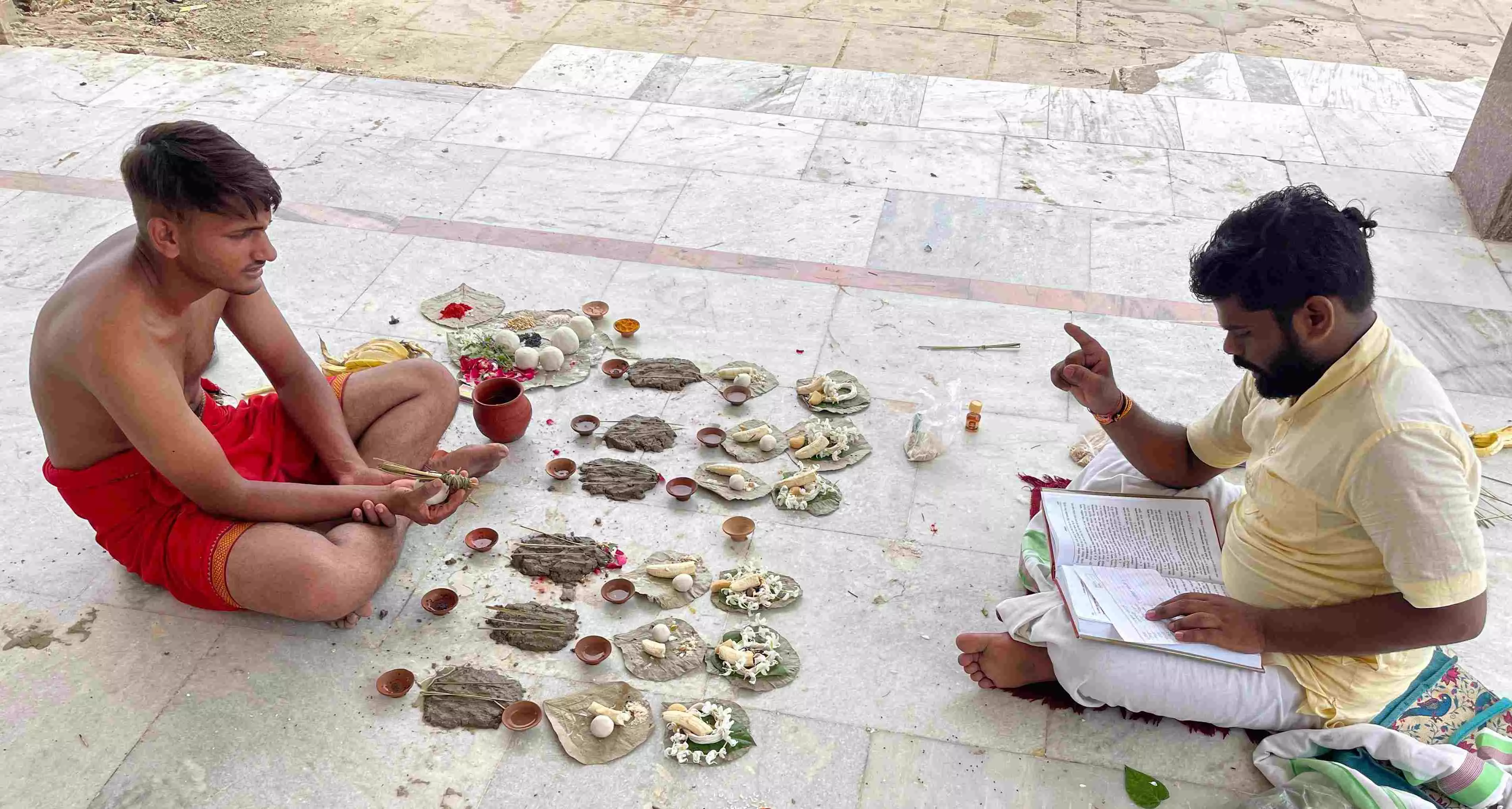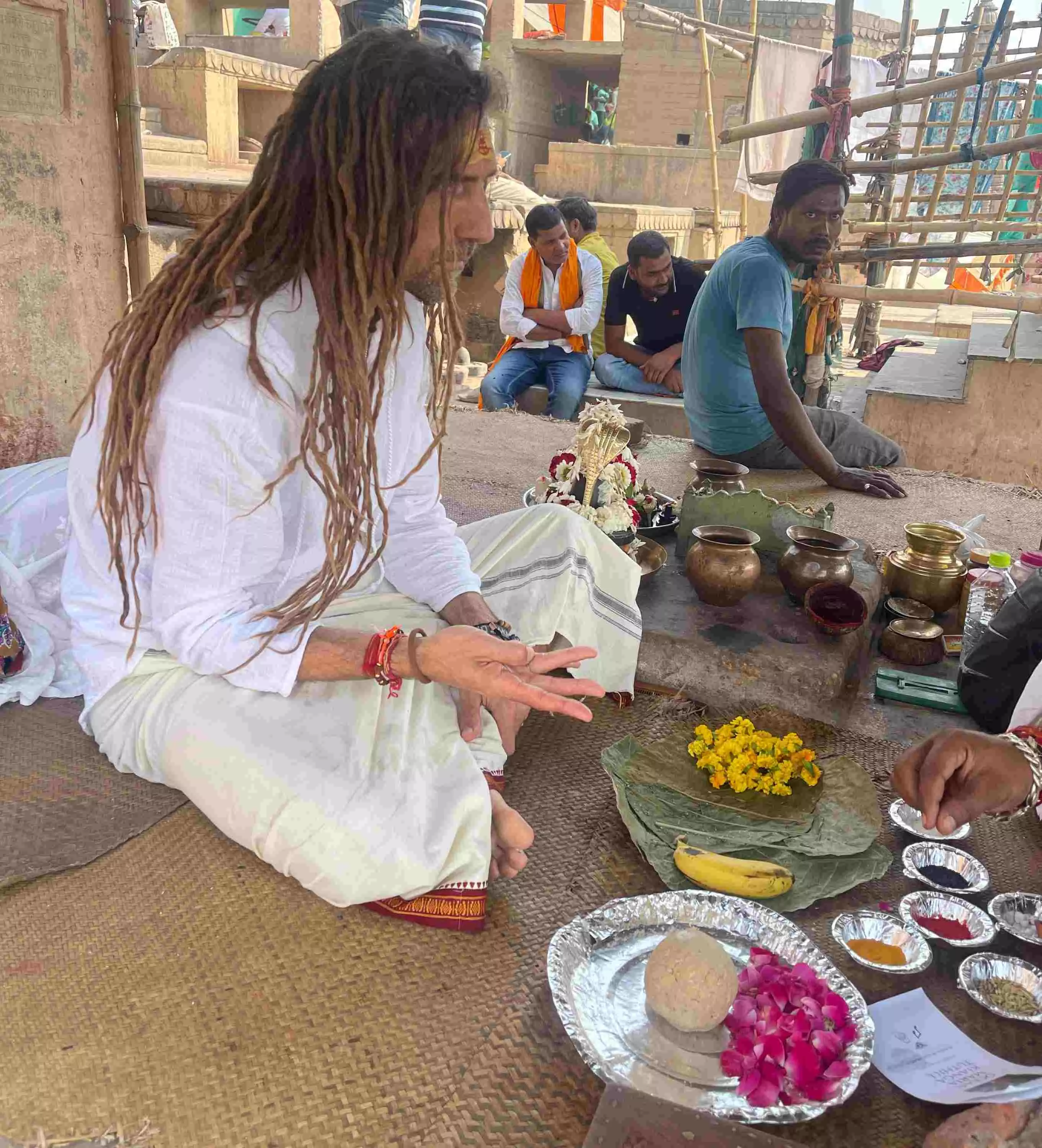Last year, when a friend of Mumbai resident Saurabh Seth wanted to do a pind-daan ritual for his deceased father in Gaya but found himself unable to travel owing to his busy schedule, Seth connected him to Prayag Pandits. “I had availed of their services in the past, they had helped arrange my family’s trip to Varanasi-Prayagraj-Gaya, and then also to Ayodhya, and connected us with...
Last year, when a friend of Mumbai resident Saurabh Seth wanted to do a pind-daan ritual for his deceased father in Gaya but found himself unable to travel owing to his busy schedule, Seth connected him to Prayag Pandits. “I had availed of their services in the past, they had helped arrange my family’s trip to Varanasi-Prayagraj-Gaya, and then also to Ayodhya, and connected us with priests there to help us with our puja. I knew they also organise online services for those unable to travel. My friend, an engineer, wanted to perform his father’s pind daan [a ritualistic offering made for the spirit of a deceased family member to attain moksha] in Gaya during the auspicious pitru paksha period [preceding Navratri], but was too busy to travel at the time. So I told him to reach out to Prayag Pandits,” Seth, who is in the travel business, said. The Prayagraj-headquartered platform found a priest to conduct the ceremony, while Seth’s friend joined in over video call.
From last rite rituals like online asthi visarjan (immersion of ashes after cremation, where the mortal remains are couriered to the portal) and pind daan at places of religious significance, to special pujas at specific temples, a host of websites and apps today are making the performance of Hindu religious acts easier not just for Indians settled abroad, but many of those living in the country. Family and other personal details, such as name and gotra (clan) are shared with the portal, which then sends a link for a video call to clients, or connects with them over phone, in case they wish to join the ceremony virtually. A priest acts as a representative of the client to perform the rituals. A video recording of the puja is sent to the client after the successful completion of the ceremony and in some cases, prasad too is couriered to them.
Narayan Rao, a Vishakhapatnam-based retired engineer, who wanted to do a special rudrabhishek puja in Kashi last year, realised the auspicious time for the ritual was just a day or two later. Unable to travel at such short notice, he contacted Varanasi-based Maha Tarpan, which arranged for a priest to do the puja on his behalf and a video of it was sent to him.
The site also offers help with the online performance of last rite rituals at places like Prayagraj, Haridwar, Gaya and Varanasi. “Most of our clients are people from India’s southern states,” said Pandit Vishal Dwivedi, adding that he had been managing the portal, which was launched in 2020, for the past three years. Maha Tarpan live-streams Ganga Aarti from the city’s ghats daily on its YouTube channel for clients to join in. Other portals, in addition to arranging online pujas, offer religious merchandise for sale or content, such as holy verses, chants and devotional music, for download; one platform has the option to ‘Gift A Puja’ to a loved one.
A few of the sites have been around for about a decade — like Puja Services, founded by Nagaraju Penumetsa in 2016-17 to “connect expat Indians with the temples in the hometowns” — but according to industry insiders, the past five years have seen a growth in the digital worship sector, with many more sites and apps starting operations.
Most of the sites offer the facility of connecting clients to priests and helping arrange for their pujas, should the client want to travel and perform the rituals in person. But while the number of bookings received for offline, in-person ceremonies may be more, the demand for online services is on the rise, they claim. And pind daan during the ongoing pitru paksha period (being observed between September 6-21 this years), remains one of the calendar highlights for most such digital platforms.

Pind daan ritual in Prayagraj. Photo courtesy Maha Tarpan
For centuries, devout Hindus have gathered in hordes in Bihar’s Gaya during pitru paksha — a period spanning approximately a fortnight preceding Navratri, believed to be auspicious for paying homage to one’s ancestors and making ritualistic offerings (pind daan) for their moksha.
It is believed that a demon named Gayasur, after whom the town of Gaya is named, received a boon from the Hindu deity Vishnu that the souls of ancestors of a person who performs pind daan in Gaya will attain release. For generations, a community of priests identified as Gayawal Pandas has maintained sole custody over pind daan rites in Gaya. While some of them have stepped cautiously into the digital sphere lately, using it to connect to clients for bookings, conducting the pind daan ritual on video for an absentee client is something that most of the pandas here frown upon.
“There is no sanction to it in our scriptures,” insisted Shambhu Lal Bithal, president of Gaya’s Shri Vishnupad Management Committee. “In Hinduism, certain places have a specific religious significance. But if pujas are performed over video with people not even setting foot at these holy places, then the importance of the location is undermined. In Pind Daan, one has to make the offering to one’s ancestors themselves, getting a priest to do it on your behalf is not the same.”
Across the country, there are many who share Bithal’s belief. According to Promod Kumar Tiwari, of Meerpur Kuti village in Uttar Pradesh’s Mau district, “Pind daan is a way of communicating with the departed souls. While the practice continues, over time its significance has been diluted. Some are even offering pind online! But the offering should be given accompanied by the necessary mantras. Only then will it have the necessary sanctity.” Banwarilal Kushwaha, Prayagraj-based businessman too rued the “commercialisation” of the pind daan service. Added VSS Sastry, an intellectual from Kolar (Karnataka) “Earlier, even people from South India would go to Prayagraj, Kashi and Brahma Kabala in Bodh Gaya to offer pind daan for 14 past generations. Now, they rarely undertake a pilgrimage to perform this ritual.” Also, now people “offer pind daan to only up to three generations of pitrus [ancestors, instead of all 14],” he claimed. Dr.Manaswini Pati of Silchar (Assam) too rued the “resorting to short-cuts” in a ritual is believed to “free our ancestors from the cycle of birth and rebirth and ‘help them] attain salvation”.
Digital platforms are not unaware of the censure that they often attract for the online services provided by them.
"The core principle of ‘online shradh’ [or pind daan] is as old as our sacred texts, which sanctioned the role of a 'pratinidhi' — a representative — to perform the rituals for those unable to make it. We're simply using modern tools to honour that ancient tradition,” claimed Prakhar Porwal, one of the founders of Prayag Pandits.
While in the initial months after its launch most of their bookings were for offline services, said the portal's other founder, Shivam Kesarwania, the breakout of the Covid pandemic in 2020, saw a surge in online demands. Many have since again started traveling for worship and last rite rituals, but the demand for online remains and e-pind daan bookings “saw a 20% increase this year over the last”, he added. Forty-two-year-old Bishwanath Gurda, a Gaya-based priest associated with Prayag Pandits said he has been conducting seven-eight online pind daans daily since the beginning of this year’s pitru pasksha period. “There will be opposition,” he said, talking about the criticism of the practice from his own community. “But this facility is for those who are unable to make it. Those who can make the trip to Gaya still do it.”
Pandit Parag Sharan, a Haridwar-based priest associated with Prayag Pandits conceded that many priests performing online pujas were secretive about it, and he himself did such rites from a separate personal ghat, where it was easier to make video recordings or video calls to clients, rather than from the town's iconic, "and crowded", Har Ki Pauri.
The role played by the pandemic in popularising digital devotional services is conceded by most service providers.
Varanasi-based Shashank Mishra launched Pitradev in 2014, to connect priests to those seeking to perform ritualistic ceremonies in towns like Prayagraj, Varanasi, Haridwar , Gaya and Nashik. In 2015-16, the US-based portal AsthiVisarjan contacted him to help their clients with online asthi visarjan and pind daan services. But it was the pandemic that gave a real boost to these services, as people even within India found themselves unable to perform these rites owing to travel restrictions. “From 15-20 bookings in a month, I started receiving 20-30 in a day,” he said. Now, even crematoriums refer people to them for their services, receiving a commission from the site in return, Mishra added.

Pind daan being performed in Varanasi. Photo courtesy Maha Tarpan
Founder and CEO Prashant Sachan, launched the Sri Mandir app and website in 2021, before the pandemic. “The full-fledged rollout and widespread adoption of our app and platform, however, occurred in 2022 and beyond, much after the pandemic,” he said. Sachan added: “While the pandemic accelerated the shift toward digital experiences, the concept of Sri Mandir was driven by a broader vision of connecting people with their spiritual practices through technology, something we saw as necessary even in a post-pandemic world."
The idea, as the Sri Mandir founder summed up and as most other digital platforms offering similar services as well as those availing of them would agree, is that "with the right use of technology, people could feel closer to their deities and engage with their faith in a modern way.”




